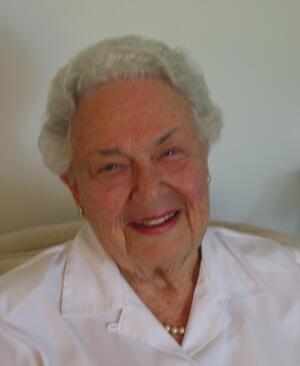Harriet Perl
Like everyone who took Harriet Perl for English or American literature at Hamilton High School in West Los Angeles, I never forgot her. She was a gifted teacher who gave the job great stature. What came back most vividly when I thought of her was her smile—radiant and affirming—and my joy in getting an A on a book report.
But that was in the early ‘60s and long before her retirement from her 35-year career for the LA Unified School District. And so when she died two years ago at 92, I attended the memorial service at Temple Beth Chayim Chadashim (BCC), a temple whose name means “House of New Life.” Thus, I learned that she had been one of the founding members of the first synagogue for lesbians, gays, bisexual and transgendered Jews in the US.
In my imagination, she was a well-adjusted spinster whose heroes were Hemingway, Faulkner and Fitzgerald. But in the packed sanctuary that day, people spoke of a much greater hero: Ellen DeGeneres. Like DeGeneres, this teacher who called herself a “radical lesbian feminist” was driven by the need to be fully herself. And in BCC that happened with the added plus of “being Jewish, too.”
In the shipyards where she worked as a pipe-fitter’s assistant during the war, she met her first female lover. To younger members of the congregation, she often spoke of the terror of being discovered as gay—a disclosure that throughout the ‘50s and ‘60s would have meant losing her livelihood on the grounds of “moral turpitude”.
The need to survive independently was instilled early on. In summers she worked in her father’s dime store; learning shorthand and typing were essential to supporting herself as a secretary. But the parental benefit that mattered most was the financial assistance to get her UCLA teaching credentials, enabling her to pursue the career that affected so many of us students.
Her involvement in the National Organization for Women (NOW) in the early ‘70s became transformational for her. Leading consciousness-raising groups from Alaska to Maine, she also helped write the NOW national guidelines. “Learning women’s history and why society hated homosexuals released me from the sense that my sexuality was in any way wrong. I finally felt full self-respect,” she later said.
Ultimately, it was Perl’s “outraged, feminist soul” which drew her to BCC. An avowed atheist, the “Texas kid” was the only child in a Marxist-Communist household; throughout her life she referred to herself as a “pink-diaper” baby. The secular, disengaged Jew who visited BCC one evening had no intention of returning. But she couldn’t resist attending a board meeting and, “more in hostility than friendship,” she told the board that “God was not male” and insisted that the liturgy be changed. Much to her surprise, they listened and gave her the chance to try.
Since BCC began in 1972, Harriet’s service to the temple included jobs as an officer, board member, treasurer, editor of the temple newsletter “G’vanim,” member of three rabbinical search committees, and co-organizer of one of the first international conferences of gays and lesbians.
But her signature accomplishment, and one in which she took no small amount of pride, was the degenderization of the prayer book. This set a precedent and became a model for many Jewish congregations and some Christian ones as well.
Nevertheless, in her last years she would write to her rabbi: “You were right to call me a God-wrestler. I do not believe and I’m sorry for that inability. But I am Jewish to the very marrow of my bones. Whether that makes sense or it doesn’t.”
In the end, it was BCC which, after teaching and feminism, would become “my third big thing bigger than myself,” she told the congregation in a drash given on her 90th birthday.
“It joined my feminism with my Judaism, validated my lesbianism, and made me a whole person. And the icing on the cake was that BCC became my family,” she concluded.
I almost didn’t go to her memorial service that day. After all, we hadn’t been in touch in the years since high school, and I thought that I was entitled to be selective about the number of sad occasions I attended. Needless to say, I’m very glad I changed my mind. Otherwise, I would have missed out on the chance of honoring someone very special indeed.




I was fortunate to have Ms. Perl as my teacher in 12th Grade at Hamilton High, back in 1975. You didn't mess with her, as she didn't readily suffer what she deemed poor effort or impolite behavior. But what an inspiring, dedicated, dynamic teacher she was. And she was clearly a staunch believer in social justice. I learned so much from her, and now, having learned so much from this obituary that I hadn't known about her, I wish I had known her better.
Dear Linda--
Such a treasure of memory to leave to yourself and the others of us who hold her forever in her hearts.
I'm grateful to you and to the wide circles of thos of us who knew her and will never forget.
Warmest regards,
Tracy